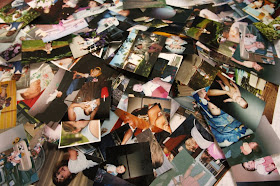 The Problem
The ProblemThis isn't exactly a part of this month's theme, but since my computer disaster I have been thinking about archiving and storage. Luckily, I had redundant backups of my Aperture database, but that doesn't mean I didn't lose any of my photos. For one thing, I was bad about putting retouched photos back into the database. Another problem: I was not as systematic as I should have been about backing up photos that were for me (I learned the hard way a long time ago to be good about backing up client photos).
When I interviewed Brad Slade about his process, he expressed concern about the longevity of digital media:
"I worry about losing digital files, whereas I still have negatives that I took in my first photo class in ’77. I wonder about migrating digital images from format to format as technology changes."I am not trying to be alarmist, but if my own cautionary tale of computer loss is to serve any purpose it may as well inspire someone to think about archiving and storage solutions.
I think that Brad's positive experience with negatives and his concerns about digital can (in part) be explained by good habits in his early training. Brad began his systematic archiving of negatives as a student because photography was his passion and his field of study. I'm guessing that most people would have a hard time digging up old negatives. I know that when I was working on cleaning out the garage I found envelopes of photos from the 80s—often with warped, bent old negatives at best.
As Brad points out, digital photography poses two main problems:
- digital storage
- migration of formats
Solutions?
At some point, we need to figure out a digital photography workflow or method for taking, processing, and storing photos. Here is a brief sample of a workflow:
- Take photos (preferably in RAW format)
- Load photos into a library such as Aperture, Lightroom, iPhoto, etc.
- Delete photos that you know you will never use.
- If your program allows it, add meta-data such as keywords, ratings, etc.
- Do any necessary or desired retouching (for some, this will be done first in RAW and then in Photoshop).
- Make sure your retouched photos find their way back into your main library.
- Backup your main library on at least one external hard drive every time you make changes to it.
- Get prints as desired. Some would argue that if you don't print your favorites at this point you may never look at them again.
Ultimately, if the system makes sense to you and if it includes backups then it's good. But here are a few words of advice:
- Not all CD backups are created equal. Mitsui Gold rates among the very best in cd-r storage. Those super cheap packs of CDs you get at most stores are great for everyday use, but they use a very unstable dye that breaks down within about 5 years (depending in part on exposure to light). Mitsui Gold lasts at least 100 years.
- DVDs have more storage but less longevity. In my experience, Mitsui DVDs are just plain horrible. DVDs have the same stability problems as the bad CDs. Taiyo Yuden media is supposed to be excellent for both CDs and DVDs, but I haven't tried their product. I remain very wary of DVDs for long-term storage.
- Online storage options abound, but don't put all your eggs in one basket. I love Dropbox (they should upgrade my storage for free based on my promo). You can get 2 gigs for free and 50 gigs for 100/yr. My wife uses Smugmug, and I know there are many other options out there.
- I admire how Tara Whitney manages to whittle down client images (unless I am misunderstanding her site) to a manageable 30-35 best-of. I would love to start doing that with all of my photography. Imagine keeping only the best. It's the digital equivalent of only keeping your favorite clothes and having a perfectly organized closet. Fewer photos (but all ones that you love)=easier storage.
- Reassess your workflow at least every other year. Search online in photography forums and see what people are doing. It never hurts to find more efficient ways to do things.
I am not very worried about that. As new formats come along there will always be people ready to help you migrate your old media (think of all those tape-to-dvd services).
How do you store photos? Do you have a workflow? Any ideas to share?

We are the best writing company providing Homework Help Online Services as our services are available for different Online Assignment help Services.
ReplyDelete